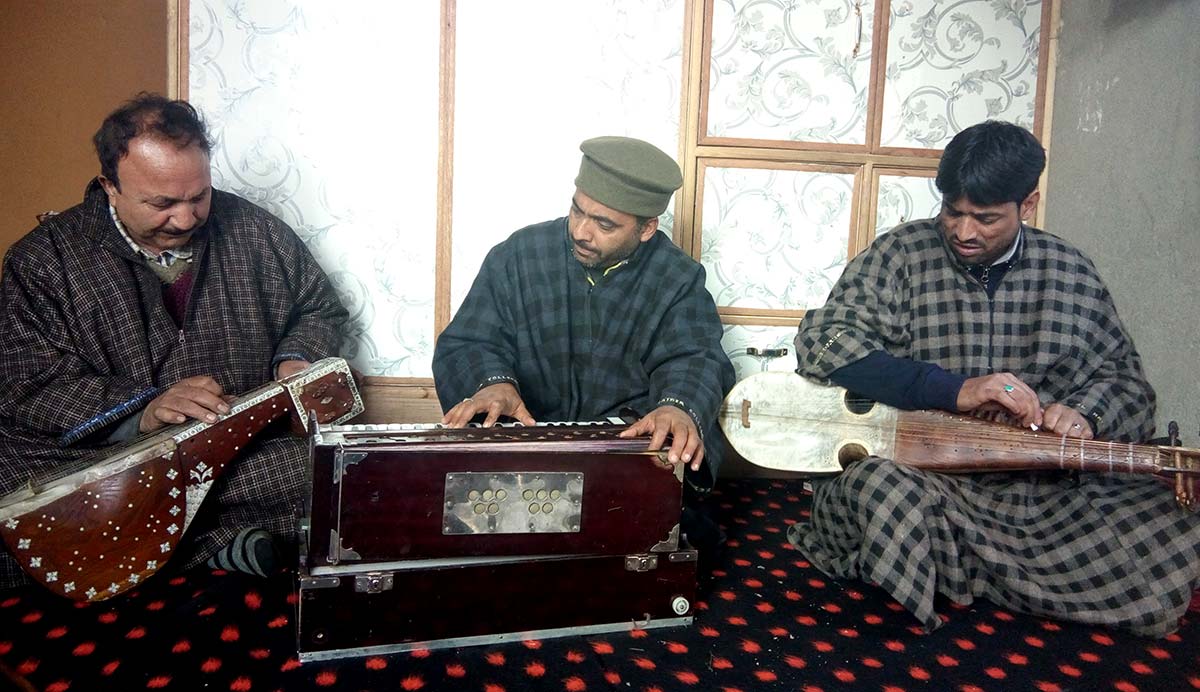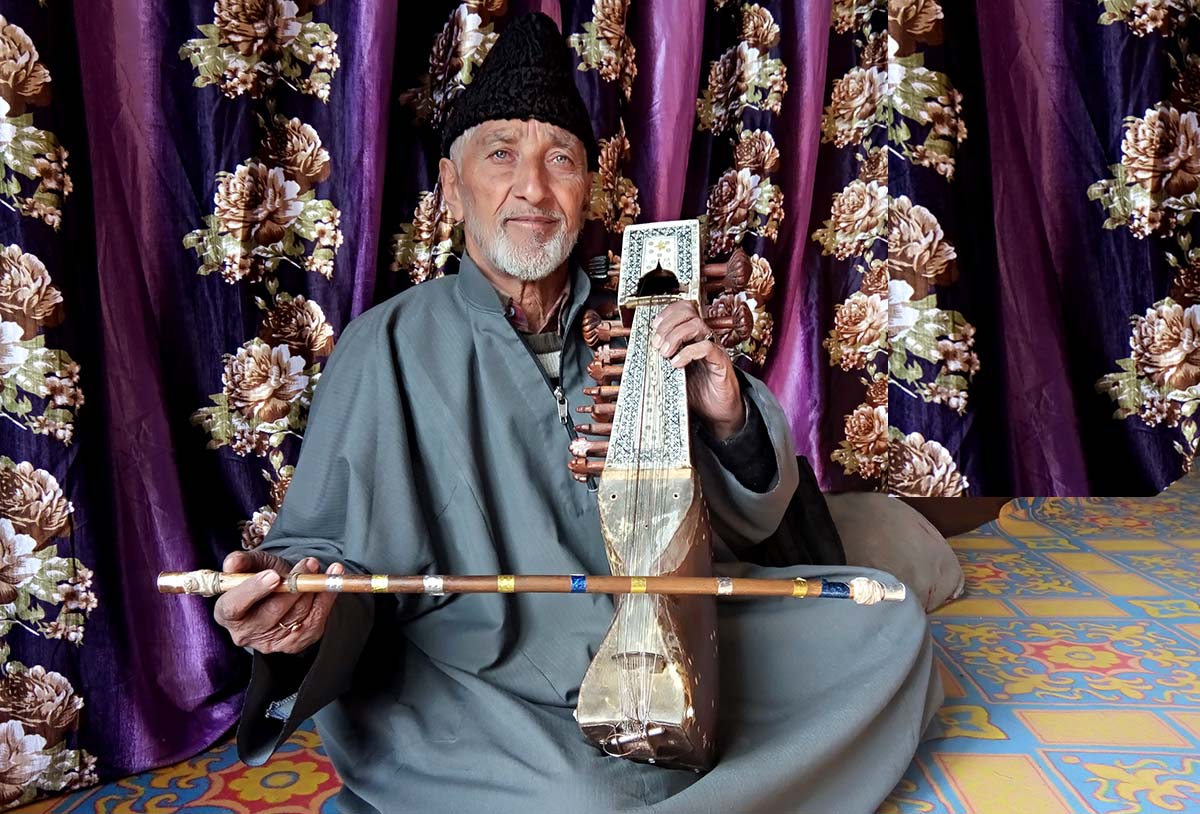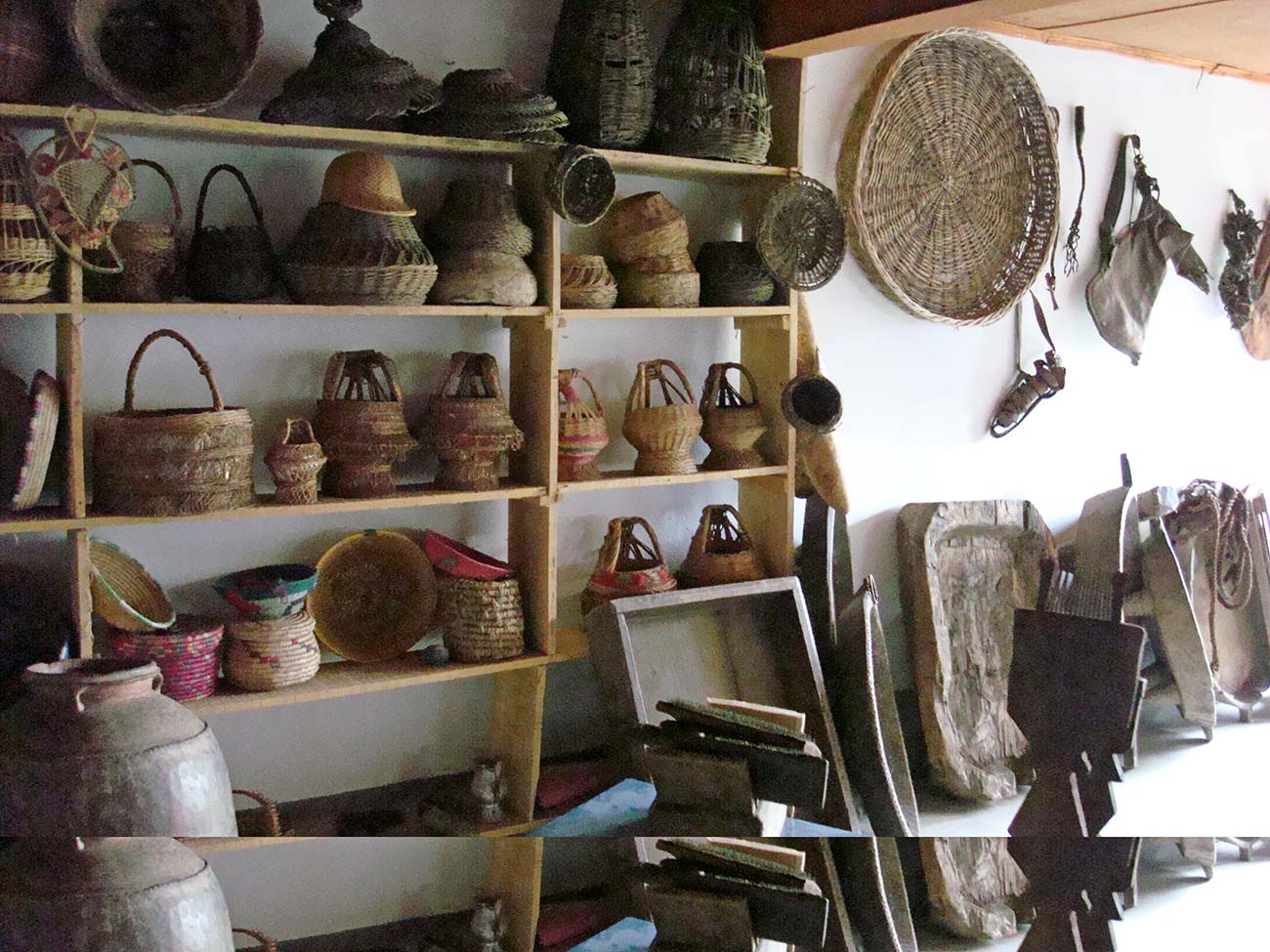Deep into north Kashmir, Faheem Mir meet a small community that sings and lives on folk music but is facing a tense situation in the last few years
It was a gloomy winter day witnessing intermittent snowing. This, however, was an ideal setting for Mohammad Ashraf Shah, who got his Rabab in his lap and started playing. For a while, it seemed as if Shah was offering a musical backdrop to what nature was doing.
A resident of Butsuma, the Patti of Rafiabad’s Rawoocha village, Shah lives in a two-room mud and timber house. Whenever he finishes his routine, he pulls out his rabab and plays. Every time the strings disturb, it creates music that seemingly supplements the natural settings around.
Music Everywhere
Almost 68 km, north of Srinagar, this village has music everywhere as around 80 per cent of the residents, are associated with music and singing. For generations, they have contributed a lot to Kashmir’s traditional music.
Everybody in the village knows how to compose and play music and most of the residents own one or many instruments – Rabab, Sarangi, Harmonium, Matka. What is more interesting; the residents are professionals, having no other source of income other than music and singing.

For generations, they have been performing in marriage ceremonies, cultural programmers, and school functions. Besides, they are accredited with the erstwhile Radio Kashmir Srinagar and Doordarshan Kendra in Srinagar. Over the years, the village has produced some famous names in Kashmir music – Khazar Mohammad Shah, Ghulam Mohammad Shah, Asadullah Shah, Khursheed Ahmad Shah, Manzoor Shah and Ghulam Nabi Bulbul.
It is because of the involvement of the entire village that at any point in time in the day tunes of musical instruments are audible from almost every home. Every house has almost every musical instrument. They start their day by setting their instruments up. There are more than six bands (Musical groups) in this village.
A Bulbul
Over the years, Ghulam Nabi Bulbul has emerged as the culture expert who is not only the “ambassador” of the village but also represents traditions outside Kashmir. He is the man who introduced his village to Kashmir thus becoming an inspiration for many.
Residents see their “drama king” in Ghulam Nabi Shah. The handsome blue-eyed artist born in 1949, has been a theatre person from his childhood. He was in the third primary when he started participating in school functions. This introduced him to a generation and the area he lives in. Gradually he picked up folk singing and would become a bachkout, a dancer.
“In 1966 I participated in a cultural event in Srinagar in which the Chief Guest was Bakhshi Ghulam Mohammad,” recalls Ghulam Nabi. “After watching my performance on stage he gave me the title Bulbul.” Since then, everybody knows him as Bulbul.
The appreciation received from the Chief Executive of Jammu and Kashmir became the key reason for Bulbul to work hard and become an ace entertainer. Bulbul represented Jammu and Kashmir five times in cultural events throughout India.

This led Bulbul to receive several awards including SAMAPA Award 2011, Gold Medal from CM in 2012, Shashrang and many others.
Bulbul served in the Jammu and Kashmir Department of Information and Public Relations (DIPR) as a music instructor. “It was 1977, I was posted in Pahalgam, fortunately, the shooting of Bollywood movie Khoon Paseena was going on and as an employee of information department I got chance to meet the film crew,” Bulbul said.
After meeting film Director, Rakesh Kumar, Bulbul was asked to play Sarangi “Rakesh ji asked me to come along to Bombay to learn more about music and he was ready to give me all accommodation but I could not take the offer due to my mother.”
Bulbul continues attending cultural functions. But what is important is that his passion for his profession led him to set up BulBul Academy of Performing Arts (BAPA). It is an academy where more than 30 youth are learning music under Bulbul’s supervision.
“We are trying to keep our culture and traditions alive,” said Sarwar Bulbul, BulBul’s son. “Students are very much interested in music and working hard to learn basics in the academy.”
Following his father’s footsteps, Sarwar is totally connected to the field of music. “I learned basics from my father, the love and respect for music is cultivated in my heart by my father,” Admitted Sarwar.
The Nightingales
But there are many nightingales in Bulbul’s village. Last year, a video went viral on social networking sites showing a Pheran-clad man in his 60s was playing Rabab on a roadside. He was Mohammad Sultan Shah, an ace Rabab player. The sufi tunes coming from the Rabab through his fingers moving on the strings, made people fall in love with this 2017 video clip.
Sultan, 65, is living with his wife and twin sons Aabid and Aadil, 19.“To me Rabab is spirituality” Sultan said. “I love to play Rabab whenever I feel loneliness.”
Mohammad Sultan has been playing Rabab with Bulbul’s group, the village’s A category band. He is being regarded as Mr Perfectionist in Rabab playing. Besides, playing Rabab, Sultan is a good sufi singer
“I can sing for more than 50 hours non-stop,” Mohammad Sultan claimed. “I am an illiterate so can’t read books but the passion is there.” Interestingly, he has a cupboard full of books.
Sultan said he remembers the entire poetry of Habba Khatoon, Shams Fakeer, Samad Mir, Rasul Mir, Mehjoor and many others. “I will be happy if this dying culture will bloom again,” Sultan said. “Our Kashmir is known as Peerwair, the land of saints, so it is our responsibility to make efforts to preserve our identity.”
Interestingly, both his sons have studied at BAPA. “Both play Rabab more professionally than me,” he said.
Accompanying their father, both his sons visited different states in India and performed. “I love to play sarangi and rabab in cultural functions,” Aadil said. “But the reality is that this art is dying day by day as the concerned department is not giving any heed to promote this tradition.”
They admitted that sometimes they feel suffocated when people around them make fun of their art. “It is not an easy job to survive in a society where people see you do not deserve respect,” Aadil said. “Bulbul sahab is our mentor and people respect him but that is a different generation,” Aadil said the modernity and the changing music systems have seriously impacted them.
New Starts
Despite the pressures that music is facing in the era of Information Technology, the village continues to throw up its stars. These days, Aadil Manzoor Shah, son of prominent singer Manzoor Ahmad Shah, is getting a lot of attention. He is one of the highest-paid artists in Kashmir’s cultural functions and marriage ceremonies.
Khursheed Ahmad Shah, 35, is another good singer, also getting good attention. Giving the credit to Bulbul for getting the village identity and improvement in the art after generations, Khursheed said he is trying his level best to come to the expectations of his elders.
“We don’t have any other source of income except this art but the unfortunate part is that concerned people in government are not interested,” Khursheed said. “Being a B-High grade singer I am supposed to perform almost every quarter in Radio Kashmir but they invite me only once a year.”
“Our village is contributing to music for generations but we are not getting even a fraction back,” Khursheed regretted. “BulBul group is graded A-top, the highest grade in folk music and we are supposed to be invited once a month but they invite us once in nine months,” said Sarwar.
Rabab On Roof
Mohammad Ashraf, 27, is sitting in a mud house and playing his Rs 30,000 Rabab. He could afford these instruments after earning this month in months of hard work.
“For me, Rabab is what your camera is for you,” Ashraf said in a low tone. “To build a house for my family is the second preference, the first thing is to keep hearth going, manage two-end meet so I choose to spend this huge amount to buy a Rabab.”
Matka player, Mushtaq Ahmad Shah says the earnings have dwindled hugely as peoples’ preferences have shifted. “We have many senior artisans in our village who are now not able to earn due to their age factor and the government should help them in this age at least,” Mushtaq suggested.
The profession’s inability to feed them properly is exhibited on the ground. The new generation is now shifting to other professions unwillingly. “Youth is showing interests in other fields of life now,” Bulbul Sr said. “The main reason is that concerned authorities are not giving any heed to promote this art.”
Last Two Years
In the last two years, the immobility enforced by the situation and the Covid19 has added to the livelihood crisis of this tiny cluster of homes that would survive for music. The village offers a tell-tale impact of this crisis.
“My father is unable to manage my tuition fees,” Ishrat Hussain Shah, an eleventh standard student said. Ishrat had gained overnight popularity on social media for singing a Kashmiri folk song at a marriage ceremony. “Now, I have started performing at various events due to the financial condition of the family.”
Abdul Rashid Shah, Ishrat’s father said they used to perform at around 30 events and functions annually but due to the continuous lockdown they are confined to their homes. “Almost 40 singers have left this profession and are struggling in other fields,” Rashid said.
Twins, Aabid and Aadil Sultan have also deserted the profession, which they had inherited from their talented father Mohammad Sultan. “It is now very tough to earn a livelihood from singing,” Aadil said. “We have started a vegetable shop in a nearby market.”















